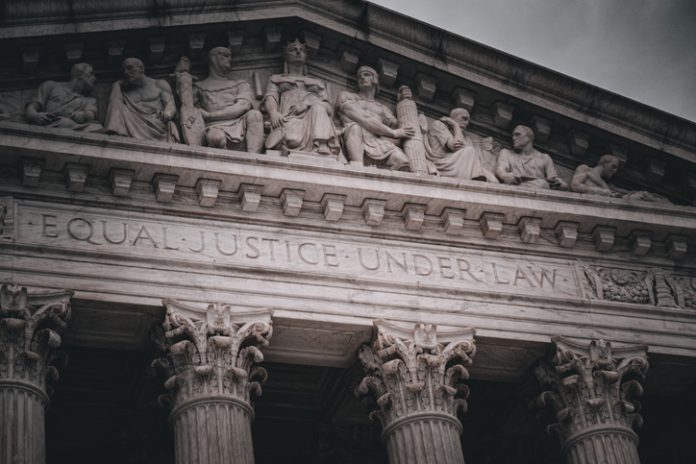U.S. Supreme Court justices offered skeptical feedback in Murthy v. Missouri, a landmark case that is testing the limits of the federal government’s power to control information during a public health emergency, during oral arguments on March 22, according to many news reports.
The case, formerly known as Missouri v. Biden, was brought by New Civil Liberties Alliance (NCLA) and deals with alleged White House and executive branch censorship of online medical opinions that did not align with the administration’s narrative on COVID-19. Plaintiffs include Jay Bhattacharya, M.D., Aaron Kheriaty, M.D., and Martin Kulldorff, Ph.D., who were outspoken in their criticisms of public health policies during the pandemic.
Media Coverage ‘Far Too Simplistic’
Jenin Younes, an attorney representing the private plaintiffs, said media characterizations of the Supreme Court’s reaction—such as an article in Politico calling the case “doomed” or a similarly negative blog from Above the Law—have been “far too simplistic.”
Younes said the justices “appeared to be grappling with determining the line between acceptable government communications with social media platforms about content moderation, and First Amendment violative ones.”
Younes says the dividing line is not between persuasion and coercion.
“The First Amendment forbids the government from ‘abridging’ the freedom of speech,” said Younes. “Abridge means to reduce or diminish, so any action the government takes to censor protected speech based on viewpoint constitutes a First Amendment violation. Thus, the government engaging in any kind of joint venture with tech companies to take down speech is unconstitutional; coercion by the government to accomplish this isn’t required.”
Justice Clarence Thomas signaled agreement with Younes’ viewpoint, asking the Biden administration’s Deputy Solicitor General Brian Fletcher, “Is the coercion/encouragement framework…the only way to look at this case?” Justice Neil Gorsuch challenged Fletcher on the grounds that strong government encouragement could border on coercion, asking him whether an “accusation by a government official that unless you change your policies, you’re responsible for killing people” could be coercion.
No Different than Conventional Practice
Justices Brett Kavanaugh and Elena Kagan raised concerns that preventing the government from influencing big tech censorship efforts would be analogous to preventing officials from calling media companies to complain about their coverage.
Younes called that a “misguided analogy” that “defenders of the censorship regime” have long been making. “First, when a government actor tries to persuade a journalist not to publish a story for some reason (national security, embarrassing for the administration, etc.), they’re trying to convince the individual not to publicize his or her own work,” said Younes.
The decision ultimately lies with the journalist. “Here, the government is coercing and persuading the tech companies to take down the speech of other individuals, who aren’t part of the conversation and probably didn’t even know it took place,” Younes said.
“Second, the journalist can always go to another venue and get the story published. And it’s only one story,” said Younes.
“Here, the government was pressuring, coercing, and persuading the companies to censor entire narratives and lines of discourse and thought, resulting in the censorship of tens or hundreds of thousands of people and millions of posts.”
Not What We Expected
Oral arguments often indicate how a case might be decided or how narrowly tailored the opinion will be. “The argument differed from what we expected in that the justices focused more on issues like standing than on the merits,” said Bob Corn-Revere, chief counsel at the Foundation for Individual Rights and Expression.
“Somewhat predictably, Justices Alito and Thomas seemed to signal their support for the plaintiffs, and Justice Gorsuch appeared to lend support on the question of standing,” Corn-Revere said. “For the justices who were more skeptical, I think they may have underestimated the extent and constancy of the demands placed on the social media platforms.”
Corn-Revere said the oral arguments left room for improvement. “I am concerned that Louisiana’s Solicitor General did nothing to help the Court devise a workable standard with some limiting principles,” Corn-Revere said. Louisiana is a party to the lawsuit, along with Missouri.
“That said, it is important to keep in mind the argument was paired with NRA v. Vullo, which presented essentially the same basic question, although it was focused more on the problem of coercion. Between those two cases, I think the Court has enough to work with to fashion a workable test.”
Corn-Revere called the state attorneys general hypocritical for bringing First Amendment claims “based on jawboning when they regularly engage in such practices themselves.” Adding, “It is little wonder some of the justices were openly skeptical of their arguments. Nevertheless, I am optimistic that, whether in this case or in Vullo, the Court will try to fashion a rule to shore up the First Amendment protections against informal censorship.”
Standard Will Be Set
Despite Younes’ criticism of media coverage of Murthy v. Missouri, she agrees with them that the justices will be divided in their rulings.
“The main questions are whether the plaintiffs have standing (whether they have suffered an injury for which the government defendants are responsible) and whether persuasion (to remove protected speech from platforms) constitutes a First Amendment violation, or coercion is required,” said Younes.
If the court set the standard at coercion, that “would be a travesty for free speech, and is not consistent with the text or spirit of the First Amendment, nor the relevant precedent,” said Younes. A decision on the case is expected in June.
Harry Painter (harry@harrypainter.com) writes from Oklahoma.




















